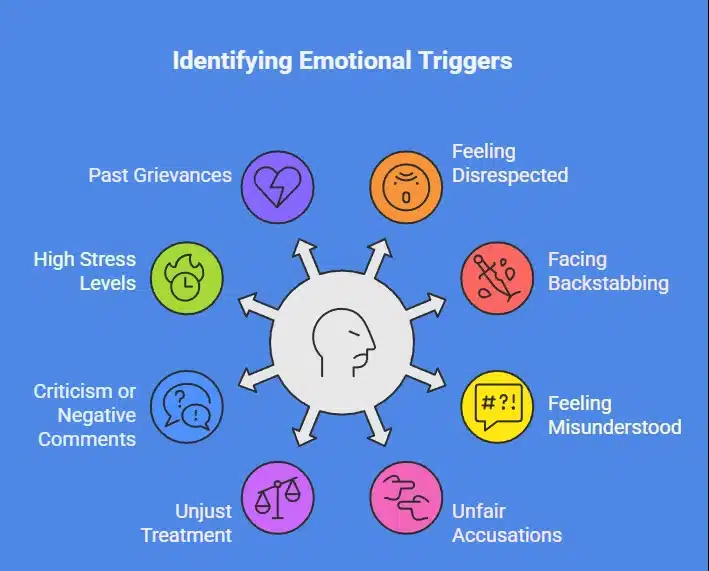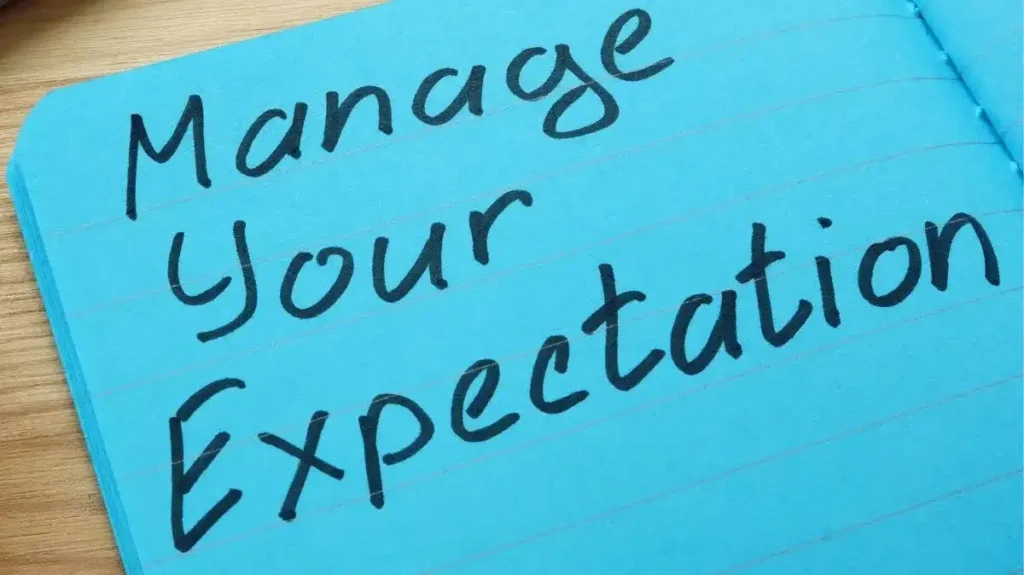We’ve all had moments when someone’s words or actions rub us the wrong way. You feel upset, offended, or angry, and these feelings linger with you.
Learning how to not let people get to you helps you stay calm and rational when faced with troublesome people or situations.
You’re able to think clearly and respond constructively instead of acting rashly.
This article provides helpful strategies to build a robust emotional fortress and keep other people’s words and actions from getting under your skin.
Before we discuss strategies to combat emotional reactivity, let’s first understand the ground we’re covering.
Don’t let someone get to you meaning

Don’t let someone get to you means not allowing someone’s words, actions, or behavior to disturb your emotional state or actions.
It encourages maintaining emotional resilience regardless of external factors.
There’s nothing wrong with having an initial emotional reaction, but it’s important not to let those feelings control you or ruin your day.
Not letting others affect you negatively leads to less stress and conflicts and greater happiness. Ultimately, how we respond to others is always within our control.
How to not let people get to you: Keep your cool
Caring about haters limits living by our values.
While it takes commitment, not being influenced by others leads you to live with greater independence, freedom, and emotional resilience.
You can cope with your feelings and center on what truly matters with the right strategies.
So, adopt best practices to shrug off judgment.
Let’s get started unlocking the first door.
The key? Knowing yourself.
Know Yourself
Enhancing your self-knowledge is the first step in building a shield against external influences.
Overdependence on external feedback shows a weak internal foundation.
As Meghan Markle noted,
“You are enough just as you are.”
Self-awareness helps you stay true to yourself, unaffected by others’ opinions.
Reflect on Your Core Values

What principles matter most? List qualities that light you up and give your life a purpose. Do you value creativity? Compassion? Authenticity? Jot down what deeply connects with your soul.
Perhaps certain values from family or society no longer serve you. It’s healthy to re-evaluate as you mature. Let go of draining inherited standards.
Select the core values that define you. It guides you in defining major decisions. When facing crossroads, consult them.
Identify Priorities
Pay attention to activities and relationships supporting your growth into your best self. What aspects of life bring you joy? Where do you crave investing time and energy? How about arts, friends, family, learning, sports, travel, or volunteering?
Now ask yourself – did I ignore any priorities for the sake of pleasing others? Be honest. Reclaim whatever you’ve sidelined. It may involve courageous conversations and breaking patterns.
But reconnecting with joy is worth any discomfort.
Embracing your truths liberates you from reacting to others and withstand any adversity.
Identify Your Triggers

Certain things tend to bother us. Recognizing these triggers can assist in handling your responses.
Some common triggers to be aware of include:
Feeling disrespected
Feeling frustrated and upset is natural when your requests and insights are ignored or dismissed.
Facing Backstabbing
Betrayal or letdown by someone close can cause hurt, anger, and disappointment.
Feeling misunderstood
Misunderstood thoughts can lead to frustration and emotional responses.
Unfair accusations
Unjust blame or questioning of your integrity is aggravating.
Unjust treatment
Witnessing or experiencing injustice, discrimination, or favoritism can cause significant frustration and discontent.
Criticism or negative comments
Criticism, judgment, and discouraging feedback can easily provoke us, especially when criticism is unfair, inaccurate, or harsh.
When you’re very stressed
Reactivity increases when exhausted, overwhelmed, or facing external pressures. High stress can amplify minor annoyances.
Past grievances
Old wounds and grudges affect our interactions with certain individuals.
Long-held resentments make it hard to trust others.
Certain personalities
We all tend to clash with certain personality types or behaviors. Recognizing those who frustrate you most aids in managing relationships.
Triggers vary between individuals, and what affects one person may not affect another.
Once you’ve identified stimuli, you can better regulate your reactions and prepare your responses accordingly.
Pause and Reflect

How often do we permit others’ opinions to shape our reality?
What if we regulate how we feel?
Try to view the situation objectively. Ask yourself:
- Is it worth getting upset? Try to look at the bigger picture.
- Is my response proportional to what happened?
- Is my reaction driven by emotion rather than logic?
A rest helps cool down heated emotions. It helps put things in perspective to assess if an emotional response is justified.
Allowing time and space between the trigger and your reaction decreases the likelihood of overreacting or making regretful statements.
Pausing before responding also demonstrates emotional maturity and self-control.
Staying calm and collected when provoked impresses people far more than blowing up or lashing out.
Acknowledge your emotions and choose deliberate responses.
Emotional intelligence protects you from emotional conflicts.
It shows you’re able to handle challenges with grace.
So, next time someone pushes your buttons, make it a habit to pause first. Taking a timeout prevents regrettable hasty reactions. It encourages open-ended thinking.
Practice pausing to gain self-control in any infuriating situation.
Related articles:
How to Start Thinking Highly of Yourself Today
I can’t be alone with my thoughts: Overcoming challenges and finding comfort
Control Yourself, Not Others
Find liberation by channeling your energy into controllable aspects amidst life’s unpredictability.
Control your responses and emotions instead of trying to change others.
You can’t dictate how people behave. But your reaction is entirely up to you.
Breathe deeply before reacting to upsetting situations. It promotes calmness and clarity of thought.
If needed, remove yourself from the situation entirely until you feel more composed.
Analyze how crucial the topic is and gain perspective. Sweating the small stuff gives others power over your emotions. Is it worth the hassle?
Also, examine your part in the situation. Did you interpret something the wrong way or make unfair assumptions? Assuming responsibility can lessen anger.
With practice, you can learn to reply wisely with less emotion.
Set Boundaries

Healthy boundaries are crucial for self-care.
This involves limiting interactions with people who regularly frustrate or upset you.
Steer clear of individuals who frequently bother you.
Don’t completely cut them out, but reduce contact to prevent yourself from their negative energy.
Prioritize your preferences over pleasing others.
Practice saying “no” and politely decline stressful activities.
You can abstain from involvement that doesn’t align with your purpose, values, and joy.
You can simply say, “Sorry, I can’t take that on right now,” without explaining.
Start asserting yourself, and don’t be afraid to turn people down when they ask you to do something you don’t want to do.
At first, this may cause fear: “But if I say no, they’ll judge me as selfish!” Remind yourself: Even if disapproved of, you won’t fall apart.
Respect your own needs and well-being. Self-care strengthens your inner foundation to handle inner turmoil.
Stop disclosing personal information or being vulnerable around critical people. Don’t cast pearls before swine. Info-dieting preserves peace.
You have every right to curate what you share and with whom. Apply discernment. Funnel emotional energy toward supportive connections.
Surround yourself with champions celebrating your success, not critics trying to stunt it.
You have every right to curate what to share and with whom. Apply critical thinking. Direct emotional energy towards supportive connections.
Surround yourself with promotes, not critics trying to stunt it.
Scale back time and transparency with hobby haters. Be picky about your inner circle.
Set boundaries in all relationships to regulate your environment.
Manage Your Expectations

It’s crucial to set practical benchmarks for how others will behave.
Lower your expectations for yourself and others. Perfection is unnecessary.
Everyone errs sometimes or behaves in frustrating ways. Be willing to forgive yourself and others when things don’t go perfectly.
Also, try not to anticipate the worst in every interaction.
People aren’t always acting with bad intentions or trying to make your life difficult on purpose. They are often just doing their best with their own challenges and struggles.
Approach new situations openly, granting people the benefit of the doubt.
Don’t prejudge how someone will act based on your past encounters. And refrain from making unfair generalizations, like “all people are selfish.”
Instead, stay focused on your behavior and how you respond to others. You can’t compel others to meet your standards.
But you can control how you perceive situations and choose to react.
You can’t compel others to meet your standards.
Find Healthy Distractions
Steer clear of ruminating on upsetting thoughts when someone is getting to you. Dwell on negatives and feel worse.
Instead, find a healthy distraction to take your mind off it. Engage in an enjoyable activity for a mental break. Relax with a book, movie, walk, pet, or anything you enjoy.
Physical activity releases mood-boosting endorphins. Exercise clears your mind and relieves frustration and anxiety.
Immersing in a hobby you love is effective, too. Lose yourself in your favorite craft, instrument, game, or creative project.
Escape stewing and find healthy breaks from troubling thoughts, people, or situations. A slight distraction can give you the space to regroup emotionally and respond thoughtfully.
Detach from the Outcome
Life is a series of unpredictable events, and plans often go awry. Emphasize your efforts and detach from the outcome, not external validation. This mindset shift liberates you from the other’s expectations.
Talk It Out
Venting to a trusted person can be therapeutic. Bottling up emotions breeds negativity.

Confiding in someone close eases the load.
Choose your confidant wisely.
Look for someone who will lend a non-judgmental ear and provide helpful advice.
Seeking wise counsel provides perspective on difficult situations. They may have dealt with similar issues and can share what worked or didn’t work for them.
Convey the facts without making negative assumptions. Keep the conversation around protecting your well-being.
Getting an outside opinion stops you from spiraling into your notions. It equips you with productive responses.
Avoid complaining to negative people to prevent feeling worse.
Attentive Filtering
Being selective about whose opinions matter can bring significant change in a sea of voices.
“Not every opinion deserves a seat at your table.”
Ask yourself, does this criticism come from a place of genuine concern, or is it mere noise?
Put away information that isn’t important and attend to what is important. Not everything requires your attention or response.
Prefer positive voices in your life.
Forget and Forgive

Releasing bitterness from past invalidation is necessary for progress.
Think of someone’s cruel words that replay on a loop, reinforcing feelings of unworthiness.
Maybe your parent constantly criticized you, making it hard to feel warmth. Or manipulative partners undermine your confidence systematically. Bullies, bosses, friends, and society cause wounds, craving antidotes for healing.
You learned to seek love, safety, and trust from others, as you didn’t get enough in childhood. It’s time to fill, not look outside, to feel complete.
Forgiveness cleanses pain, permitting grace to restore your power. It rarely involves interacting with repeat boundary violators. You break free from their influence over your self-worth.
Yet without forgiveness, we chain ourselves dragging the weight of other’s wrongdoing holding us back.
Unresolved anger also damages our health and peace of mind.
Forgiveness releases sway over situations and justice. Life can still be unfair; forgiveness sets you free regardless.
Reconnect with yourself to boost self-worth.
Repeat affirmations like:
“I forgive others and forgive myself for past cycles of unworthiness and shame, I now walk proudly into my full power.”
Say this even if you’re not quite sure you believe it.
Foster healing through forgiveness. Soon, you’ll be empowered by self-love; no validation is required.
Embrace Constructive Feedback
Not all criticism is harmful; constructive feedback holds pearls of wisdom. Distinguish destructive criticism from valuable input.
Embrace the latter as a tool for personal and professional advancement. Just remember, growth is uncomfortable, but that’s when we evolve.
Cultivate Self-Intimacy
Validating yourself begins with cultivating a rich inner life and relationship with your essence. Think of it like nurturing a friendship with yourself.
Self-intimacy stems from curiosity, not judgment.
Explore activities fostering a connection with your innate wisdom. Creative pursuits like journaling, art, and dance unveil inner landscapes otherwise obscured by daily distractions.
Nature and meditation silence external noise for inner guidance.
Embrace your entire self, flaws and all. Show kindness when you stumble as a lover and beloved.
Journal your anguished questions and frustrations, then listen inwardly for responses. Or have imaginary conversations with your neglected inner child. Unpack these layers patiently.
As self-trust flourishes, you’ll worry less about others’ opinions.
No more living reactive to outside elements. Now, you dwell peacefully from within.
Your bond with your inner self withstands life’s highs and lows.
These techniques help you guard against negative forces on your emotional well-being. Enjoy the ride, celebrate your achievements, and stay strong.
Final thought
How to not let people get to you takes consistent practice and self-awareness.
Practical strategies to build emotional resilience include self-awareness and reflection on core values, help to identify triggers and manage emotional reactions.
Setting healthy boundaries, managing expectations, and finding distractions contribute to a healthy mind frame. Detaching from outcomes, discussing challenges with trusted individuals, and embracing constructive feedback aid in personal growth.
Seeking wise counsel, accepting feedback, and detaching from outcomes facilitate self-mastery.
Forgiveness of others and ourselves releases pain and restores personal power. Self-intimacy and cultivating a rich inner life further contribute to guarding against negative forces and living peacefully from within.
Finally, celebrate achievements and stay firm amid life’s highs and lows.
Take charge now!
How to Not Let People Get to You Quotes
Here are a few quotes on how to not let people get to you:
“You have power over your mind, not outside events. Realize this, and you will find strength.”
– Marcus Aurelius
“No one can make you feel inferior without your consent.”
– Eleanor Roosevelt
It is our choices that show what we truly are, far more than our abilities.
– J.K. Rowling
“Don’t be pushed around by the fears in your mind. Be led by the dreams in your heart.”
– Roy T. Bennett
“The only person you are destined to become is the person you decide to be.”
– Ralph Waldo Emerson
“You wouldn’t worry so much about what others think of you if you realized how seldom they do.”
– Eleanor Roosevelt
“Your time limited, don’t waste it living someone else’s life.”
– Steve Jobs
“To be yourself in a world that is constantly trying to make you something else is the greatest accomplishment.”
– Ralph waldo Emerson
“The strongest people are not those who show strength in front of us but those who win battles we know nothing about.”
– Jonathan Harnisch
“Don’t let the noise of others’ opinion drown out your inner voice.”
– Steve Jobs
Hi i think that i saw you visited my web site thus i came to Return the favore Im attempting to find things to enhance my siteI suppose its ok to use a few of your ideas
Happy to help you.
An excellent, thoughtful, and highly insightful work. It made me consider so many things, and I had to confront my hesitancy to embrace forgiveness and my frequent inability to forget when wronged. I was never wired that way, but I never contemplated those personality traits until now. That you have spurred me to become introspective–if only for the nonce–where few have succeeded speaks volumes about your writing ability. Well done, Doctor.
Thank you very much for your kind words. It’s heartening to hear that my work has resonated with you and has prompted you to delve deeper into yourself. Wishing you continued insight and growth on your path.
Excellent information sir
Thank you! Feel free to ask; I’m here to help!